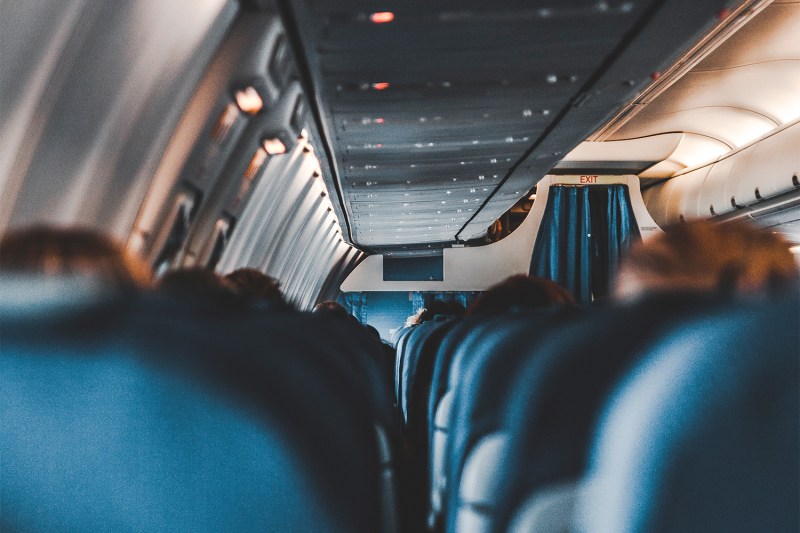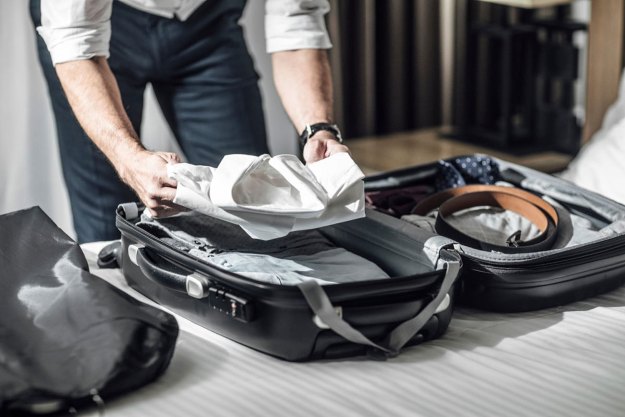
Forget working on a deep sea oil rig, crabbing in Alaska, or risking life and limb fighting wildfires. Airline PR Rep has to be the toughest job in the world. Daily responsibilities include convincing customers that your client is not, in fact, the devil. Americans are happier dealing with the IRS than with most airlines. Now, we have one more reason to mistrust — or downright loathe — airlines. It turns out many airlines have technology installed in every seat with the capability to “see” their passengers.
CNN recently reported on a Twitter user who posted photos of “an interesting sensor” he noticed aboard a Singapore Airlines flight. He found the device, which looked suspiciously like a camera lens, embedded just below the inflight entertainment system (IFE) on the headrest in front of him. The airline confirmed that it was indeed a camera, but went on to clarify, “These cameras have been intended by the manufacturers for future developments … [They] are permanently disabled on our aircraft and cannot be activated on board. We have no plans to enable or develop any features using the cameras.”
CNN reached out to several domestic and international airlines, including Delta, United, American, and JetBlue, who all confirmed their cameras are dormant. Most agreed with American Airlines’ response that they are “a standard feature” that’s part of every stock IFE system. However, none has plans to do anything with them. While the news might surprise most air travelers, the technology has been an “open secret” for some time. Two years ago, Panasonic Avionics proudly debuted a high-tech version of their new IFE for Emirates airlines which included a camera, speaker, and microphone.
Still, in an age where it seems public restrooms are the only remaining place not under surveillance, these cameras are sounding a few alarms. Most air passengers agree that heavy camera use is a necessary evil to bolster airport security, but is there really a need for anyone to be spying on us while we’re sleeping on a cross-country red-eye flight? It’s raised enough eyebrows that two U.S. senators — Louisiana’s John Kennedy and Oregon’s Jeff Merkley — are probing major domestic carriers for answers. They want concrete data on the number of cameras being used and “the type of information that is collected or recorded.”
At a time when many airlines are barely turning a profit, it’s unlikely they could afford or would even care to hire a secret cadre of surveillance workers to spy on passengers’ in-flight routines. What is a concern, however, is whether and how nefarious third parties might hack these cameras. The senators are calling this potential misuse of “a serious breach of privacy.”
That might sound like a bunch of Alex Jones-level conspiracy theory nonsense, but consider that just this year, Apple realized that hackers could easily spy on your FaceTime calls without your knowledge. If you own an Amazon Alexa-enabled device or any Android smartphone, it’s likely recording everything you say and sending it to the cloud. So, if some ne’er-do-well can hack those devices, they can easily listen in on your most private conversations.
While this all might sound scary, the best method to defeat camera snooping — whether from your laptop or your airline’s IFE system — is surprisingly old-school: electrical tape. Mark Zuckerberg does it, and you probably should too. It’s cheap, simple, and works every time.
Editors' Recommendations
- How to renew Global Entry (and when you should do it)
- Here’s how much it will cost you to charter a Four Seasons private jet
- Why travel experts think you should expect airline tickets to get more expensive
- Upgraded seats, renovated airport lounges, and more: 4 British Airways changes you’ll love
- Delta is the latest airline to increase baggage fees — here’s how much every major airline charges now


